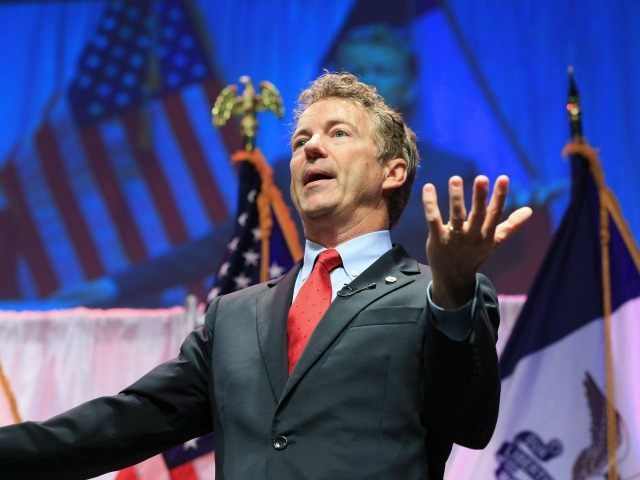Sen. Rand Paul (R-KY) tells Breitbart News he thinks his new tax reform plan—which would institute a flat tax of 14.5 percent for all individuals and businesses, do away with the current IRS tax code completely, and eliminate the payroll tax—is the “boldest plan out there.”
“The current tax code is 70,000 pages and we think it’s been chasing American jobs overseas and chasing American companies out of our country,” Paul said when asked about the new plan, which he unveiled this week.
We thought about whether we could fix it or not, and really we think it’s beyond fixing—so we figured we should just scrap the whole thing, start over and see what we can do with a flat tax for personal income and for business. What’s unique about ours—there have been flat taxes proposed in the past—but what’s unique about our flat tax is we were actually able to eliminate the payroll tax, we eliminate FICA.
I think some of the flat tax proposals have struggled in the past because Democrats have said, ‘oh they’re just for the rich.’ But the interesting thing about ours is somebody making $30,000 gets over a $2,000 tax cut. It’s a significant tax cut for people who don’t pay much already in income tax but their main tax is a payroll tax. I think this would be a great way to have a tax cut that everybody gets a little bit of.
Paul said that putting forward a plan like this allows conservatives and Republicans to go straight after Democrats in a legitimate effort to discredit the argument that a bigger federal government is the way to grow the economy and create jobs.
“Then we have the argument with Democrats on how is the best way to create jobs. Democrats think we should send our money from Kentucky to Washington and then Washington will spread it out to people to try to create jobs and do business,” Paul said.
In reality I think the better way to create jobs is to never send it to Washington in the first place. Let’s say you have a billion dollars and you send it to Washington and ask for some back, inevitably the bureaucracy soaks up some of it but then they often give it to the wrong people because they base those decisions on cronyism.
If you get a tax cut of a billion dollars, it goes back to the community of people who are already in business and so Democratic capitalism has already decided who is good at business and who is not so the people who actually get it are the people who are productive. People who already have businesses can expand them. We think this is a better way and more efficient way to create jobs and it’s a significant tax cut and we’re proud of that. We think it’s the boldest plan out there and some are saying they think it’s the most pro-growth tax plan that’s been submitted so far.
Paul noted that the nonpartisan Tax Foundation, which reviewed and scored his plan, found that it would create more than 1.4 million jobs and grow the economy 9.4 percent in the long run.
“The Tax Foundation which is a nonprofit organization has looked at it and they feel like it is a really strong, pro-growth plan—it would add 10 percentage points to the GDP and it would add over a million jobs,” Paul said.
They think it’s really pro-growth and for a couple of reasons: One is it reduces the tax on investment income from about 24 percent down to the 14.5 percent, some say that’s a great way to grow the economy. But it also allows every taxpayer and every business to do expensing their first year. We have a tax code now that as a doctor if I buy some chairs for my lobby I can’t write them off for 36 years and that’s crazy because they’ll only last two or three or four years.
I’m more likely to get more if you actually let me expense them. I think this is something that really allows the economy to get going—there’s a lot of money in America, it’s just sort of bottled up and at the fate of government. Some companies, quite frankly, have become so fearful of government taxes that they’ve actually fled the country.
Paul’s argument that the government should leave money in the pockets of Americans—rather than run it through the Washington bureaucracy—is one he’s used to with regard to his plan to economically revive America’s inner cities like Baltimore and Detroit as well.
“That’s exactly what I’ve been talking about for the inner cities—we have sort of a separate plan that we’ve put together under the old tax code that would leave $1.3 billion in Detroit. Once again, it’s not taking it from anywhere—it’s just leaving it there,” Paul said.
The only way, Paul says, that any of these ideas will work in the long term however is if politicians in Washington are willing and able to cut wasteful spending—something he’s eager to do if elected president.
“The only way this works is if you’re willing to cut spending and if you aren’t willing to cut spending then you have a problem,” Paul said.
But we’re willing to do this and cut spending. We also think there will be significant growth from this and when the Tax Foundation scores this dynamically in terms of how much growth is going to happen they’re just amazed at what this will do for the economy. We’ve also had several leading champions on the conservative side for tax reform that have said that they like aspects of this—Steve Forbes, Stephen Moore and Art Laffer have all given us some advice on this and are complimentary of the plan.

COMMENTS
Please let us know if you're having issues with commenting.